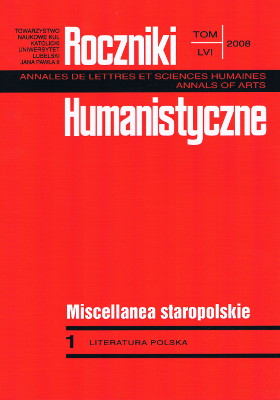O warsztacie tłumacza sandomierskiego przekładu Pensées B. Pascala
Abstrakt
The translation of Blaise Pascal’s „Pensées”, especially confrontation with this work on the stylistic and rhetorical level, is a challenge that calls for talent and workshop skills. Among the European translators of the work, we find an unknown author who had translated “Pensées” into Polish. The translation was found in the collections of the Library of the Theological Seminary in Sandomierz. The manuscript is likely to have been written among the Radom piarists in the second half of the eighteenth century. It was based on the Paris edition of “Pensées” in the so-called Port-Royal composition in its version after 1678 and before 1761.
The style of the anonymous translator is not absolutely pure. On the one hand he writes briefly and with reticence, avoiding exaggerated ornaments. He clearly sought to render the style and model of Pascal’s sentence in his translation (his syntax and word order). It happens, however, that he gives in to moralistic persuasion and in some more difficult places he aspires to clarify the intentions of the French author, which leads to redundant repetitions.
The poetic images preserved in the translation are not so plastic and suggestive as in the original. It seems that the translator fails to perceive in it some values that enrich the discourse and therefore he weakens their expression. In many places he depreciates also rhetorical ornamentation and withdraws the baroque style. His strategy of translation is therefore in the line of strictly eighteenth-century stylistic and rhetorical tendencies by which to shape expressions.
Copyright (c) 2008 Roczniki Humanistyczne

Utwór dostępny jest na licencji Creative Commons Uznanie autorstwa – Użycie niekomercyjne – Bez utworów zależnych 4.0 Międzynarodowe.





